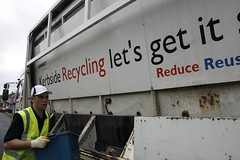Practice the 3 Rs as a Family
If you're new here, you may want to subscribe to my RSS feed. Thanks for visiting!
Practice the 3 Rs as a Family
The three R’s of environmentalism are reduce, reuse, and recycle. They are important for green families to know and consider in daily life as they often serve as the foundation for green goals and family ideals. All three of them should be considered whenever we take out the trash or buy new products for the home.
Reducing basically means eliminating things you don’t need to; making less garbage. When making purchases it is important to determine if the products you are buying are really necessary. Many times we tend to find that we buy many luxury items along side the necessities. There is nothing wrong with treating yourself occasionally but as a rule simplicity is better. If you do decide to buy, you can still reduce your landfill contribution buy electing to buy products that will last for a long time or have another use later on.
Purchasing reusable items that need not be thrown away is another great way to avoid landfill waste. It is environmentally reckless to use disposable products that can only be used once before being thrown away. This puts a burden on our planetary resources and creates needless waste.
![]() photo credit: Elrenia_Greenleaf
photo credit: Elrenia_Greenleaf
Recycling is the process by which materials are collected and used as a basis for new products or materials. Recycling items that you would otherwise throw away reduces landfill waste and helps us conserve energy and money. Buying products made from post consumer recycled materials encourages more recycling.
Here are just a few of the ways that green families can practice the 3 R’s:
1. Use dishes, flatware, and glasses instead of their disposable counterparts.
2. Set out cloth napkins for family meals.
3. Use cloth diapers and cloth baby wipes.
4. Start a compost pile for kitchen scraps.
5. Ask yourself if that item you have your eye on is a necessity or a luxury.
6. Donate toys and clothes you no longer have a use for to others that can use them.
7. Instead of buying new check out second hand stores or online message boards like Craigslist and Freecycle.
8. Start an organic garden to reduce your grocery bill and time spent shopping.
9. Buy rechargeable batteries.
10. Invest in reusable shopping bags and stop using the paper and plastic ones provided by the store.
11. Join a book or clothing swap.
12. Recycle your old cell phones and eyeglasses.
13. Use paper scraps and old magazines for kids craft projects.
14. Don’t purchase greeting cards and invitations from the store, send digital invites and greetings instead.
15. Use worn out clothing and make a memory quilt that will be treasured for generations to come.






